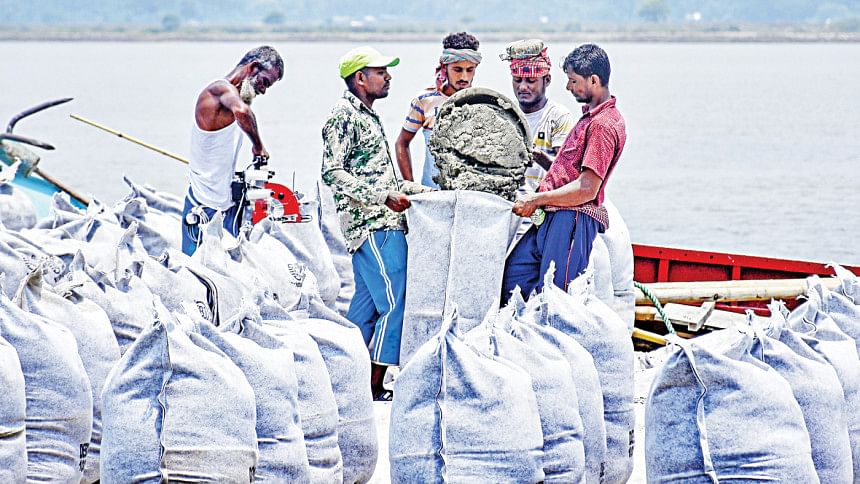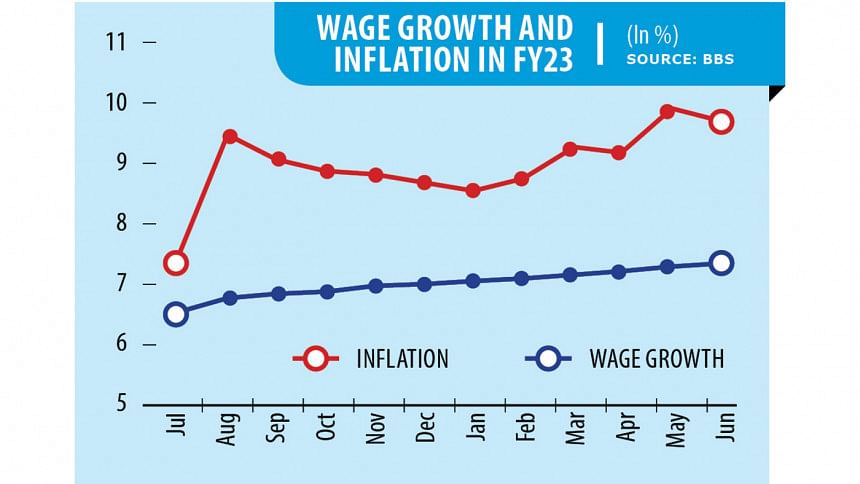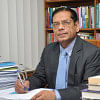Workers’ woes won’t end as inflation outpaces wage growth

The cost-of-living crisis seems to have brought more woes for daily workers in Bangladesh than other groups of labourers as their average wage growth has been below the inflation rate for the past two fiscal years.
This means daily workers did not receive any relief from the 12-year high average inflation in the just-concluded fiscal year although the wage has been ticking up for the past 17 months.
Data released by the Bangladesh Bureau of Statistics (BBS) showed that the average wage of low and unskilled workers was 7.04 per cent in 2022-23 while the Average Consumer Price rose 9.02 per cent.
This results in a 1.98-percentage-point gap between average inflation and wage growth in FY23 against 0.09 percentage points seen a year earlier.
The Wage Rate Index of the national statistical agency takes into account the wages of informal sector workers across 44 occupations in the agriculture, industry and service sectors who get their payments on a daily basis.
In Bangladesh, inflation has been running high for more than a year, owing to the Russia-Ukraine war-induced higher import costs, a larger depreciation of the taka and the upward adjustments of fuel and energy prices as well as domestic market imperfections and syndication.
Analysts say the widening gap between the inflation rate and the wage growth rate is forcing low-income and unskilled workers to cut consumption amid falling real incomes and the rising cost of living.
"The government has supported its employees through increments, which may have saved their real incomes," said Mustafa K Mujeri, executive director of the Institute for Inclusive Finance and Development.
"But around 85 per cent of workers in Bangladesh belong to the informal sector and they have remained unprotected. This vast majority of workers are totally dependent on the labour market."
Mujeri went on to say that in terms of real wages, workers' earnings have decreased.
"As a result, they are continuously struggling to make ends meet. They have cut costs and other essentials, have failed to ensure a healthy diet and used up their savings."
Talking to The Daily Star yesterday, a construction sector worker Mohammad Ashraful Alam said he is finding it difficult to survive with his limited income.
Alam, who hails from Jamalpur district, earns Tk 650 every day for working in construction companies in the capital.

He has been working in Dhaka for seven months and has not seen his wage increase although consumer prices show no sign of declining.
"The wages are too low compared to the hard work we put in and it is tough to survive," said Alam, who is the lone breadwinner of his six-member family. The family lives in the district town.
Rafiqul Islam, a farm labourer in Sirajganj, gets Tk 300 for a day's work.
"We have been getting the same wage for most part of the last two years. The wage only goes up to Tk 700 during the paddy harvesting season," he said.
He said the prices of all essentials have risen significantly in recent times. "But our wages have not increased."
Khondaker Golam Moazzem, research director at the Centre for Policy Dialogue, said self-employed people in the informal sector such as rickshaw pullers and street vendors have adjusted their wages to some extent in line with the rising cost of living.
"But labourers who work on a daily basis and lower income groups are in a tight spot since they don't have any scope to have their wages adjusted."
According to Moazzem, although the government is trying to give some cushion to the ultra-poor and low-income groups through social protection programmes, there are selection errors, which deprive those who need the support the most.
Referring to a study conducted by the CPD in 2020, he said 65.6 per cent of the country's households that receive financial assistance under the social safety net programmes are ineligible as they belong to the non-poor category.
The government is currently selling some essentials among one crore families at subsidised rates to give them some relief. But Moazzem alleged that not all of them are real beneficiaries.
He said low and unskilled workers have been forced to cut the expenses aimed at meeting basic needs.
Mujeri thinks if the government does not rein in inflation soon, the lower income groups would not be able to survive for long.
He suggested the government strengthen the existing social protection schemes.

 For all latest news, follow The Daily Star's Google News channel.
For all latest news, follow The Daily Star's Google News channel. 








Comments